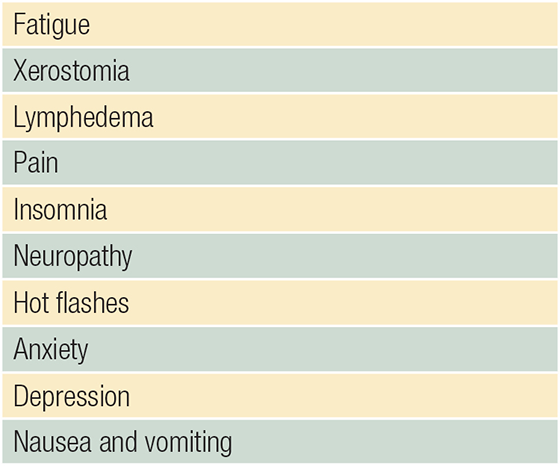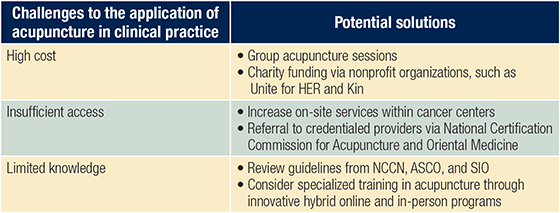Key Points:
- Acupuncture is a medical technique rooted in Chinese medicine that has beenused for millennia to improve health and well-being.
- Despite growing interest and increasing evidence for its effectiveness in reducing symptom burden, the use of acupuncture remains low among patients with cancer.
- High cost, insufficient access, and limited knowledge are the primary drivers of the underuse of this treatment modality.

Patients diagnosed with cancer often experience unpleasant symptoms from their disease and its treatments. Hot flashes, nausea and vomiting, peripheral neuropathy, muscle and joint pain, fatigue, lymphedema, sleep problems, and dry mouth are frequently difficult to treat despite the availability of conventional medical therapies. In these instances, acupuncture should be considered as an integral part of a cancer treatment plan.
Is There Evidence That Acupuncture Works?

Since the 1970s, more than 10,000 randomized controlled trials (RCTs) onacupuncture have been completed, and it is increasingly accepted as an effective treatment modality worldwide.1 In 2002, the World Health Organization completed a review of clinical trials of acupuncture, noting its potential utility in treating dozens of conditions ranging from neurologic and psychiatric disorders to gastrointestinal and dermatologic ailments.2 Acupuncture is used in 103 of the 129 countries that report data to the World Health Organization, and the U.S. National Health Interview Survey showed a 50% increase in the number of acupuncture users between 2002 and 2012.3 In 2022, a group of researchers completed an analysis of more than 2,400 systematic reviews of acupuncture that suggested underuse of this treatment modality in both clinical practice and health policy.1
In the management of symptoms related to cancer, evidence for the use of acupuncture continues to increase.4-7 A meta-analysis of 10 RCTs published in 2017 found a significant reduction in cancer-related fatigue in patients undergoing acupuncture (compared with sham controls and usual care).8 In 2020, a systemic review and meta-analysis of 17 RCTs found that, compared with a sham acupuncture control group, real acupuncture was significantly associated with reduced cancer pain and reduced use of analgesic medications.9 In 2021, the PEACE trial found that acupuncture produced greater pain relief than usual care for chronic musculoskeletal pain among survivors of cancer.10 A 2021 meta-analysis of 20 RCTs involving patients with breast cancer indicated that, compared with waitlist control and usual care, acupuncture led to significant reductions in pain intensity, fatigue, depression, hot flash severity, and neuropathy (Table 1).11

The National Comprehensive Cancer Network includes acupuncture as a modality to consider in a variety of components of survivorship care, with a particular emphasis on fatigue, hot flashes for men and women, neuropathic pain, arthralgias, myalgias, myofascial pain, nausea, and vomiting.12 In December 2022, ASCO and the Society for Integrative Oncology released joint guidelines regarding integrative medicine for pain management in oncology. The authors noted that acupuncture should be recommended for aromatase inhibitor–related joint pain and may be recommended for general cancer pain or musculoskeletal pain.13 With growing evidence for its value, acupuncture is increasingly used by cancer centers. A 2016 study found that nearly three-quarters of National Cancer Institute–designated cancer centers offer acupuncture services for patients and that nearly 90% provide information about it.14
The National Comprehensive Cancer Network includes acupuncture as a modality to consider in a variety of components of survivorship care, with a particular emphasis on fatigue, hot flashes for men and women, neuropathic pain, arthralgias, myalgias, myofascial pain, nausea, and vomiting.
Are Patients With Cancer Using Acupuncture to Treat Their Symptoms?
Although patients are increasingly interested in acupuncture and evidence has mounted for its efficacy, utilization has lagged. A 2022 study indicated that 83% of patients with cancer expressed interest in using acupuncture, but only 1% underwent treatment.15 These findings were consistent with those of a previous study, in which 79% of patients were interested in using acupuncture as an antiemetic therapy, yet none of the patients actually used it.16 Why the disconnect? What can we, as practitioners, do to improve it?
Acupuncture can be costly and time consuming, with first-time acupuncture visits ranging from $15 to $400.17 Depending on the condition, multiple visits are typically required—for example, weekly visits for 8 to 10 weeks. Services may not be covered by insurance (ie, Medicare, for example, only reimburses for acupuncture in the case of low back pain).18 Some practitioners offer community acupuncture, a lower-cost model in which patients receive treatment in a group setting.19 For those for whom cost remains a barrier, funding may be available to cover or defray expenses. Unite for HER, for example, is an organization that provides access to integrative services for patients diagnosed with breast and ovarian cancer.20 Another organization, Kin, provides integrative services (including acupuncture) to patients with cancer and their family members at no charge through the support of the local community.21

In some instances, acupuncture can be provided concurrently with other cancer care, such as during an inpatient visit or a chemotherapy infusion.22,23 Although most National Cancer Institute–designated comprehensive cancer centers offer acupuncture, there remains significant variation between institutions, and many cancer centers do not have this resource. For those without on-site services, referral to a trusted and qualified acupuncturist can be considered.24 Practitioners should be appropriately licensed and credentialed—such individuals can be found in a database from the National Certification Commission for Acupuncture and Oriental Medicine.
In addition, patients and practitioners alike may have limited knowledge of the potential value of acupuncture. Many health systems now provide basic information on the principles and use of the therapy, which may be a helpful resource.25-27 Oncology practitioners can become more familiar with when to consider acupuncture by reviewing the emerging guidelines from professional organizations such as the National Comprehensive Cancer Network,12 ASCO, and the Society for Integrative Oncology.13 Perhaps one of the most effective ways for practitioners to acquaint themselves with the principles and practice of acupuncture is to complete training in medical acupuncture. Several such programs exist and are designed for actively practicing clinicians, with a combination of online and in-person learning over the course of about 9 months (Table 2).28,29
Acupuncture is an evidence-based treatment modality that can be beneficial for a variety of symptoms common during cancer treatment.
Final Thoughts
Acupuncture is an evidence-based treatment modality that can be beneficial for a variety of symptoms common during cancer treatment. Oncology practitioners should consider how best to incorporate it into treatment plans for patients.
References
- Lu L, Zhang Y, Tang X, et al. Evidence on acupuncture therapies is underused in clinical practice and health policy. BMJ. 2022;376:e067475.
- Acupuncture: Review and Analysis of Reports on Controlled Clinical Trials. World Health Organization; 2002.
- National Center for Complementary and Integrative Health. Acupuncture: What You Need to Know. Accessed August 4, 2023.
- Zia FZ, Olaku O, Bao T, et al. The National Cancer Institute’s Conference on Acupuncture for Symptom Management in Oncology: state of the science, evidence, and research gaps. J Natl Cancer Inst Monogr. 2017;2017(52):lgx005.
- Zhang J, Zhang Z, Huang S, et al. Acupuncture for cancer-related insomnia: a systematic review and meta-analysis. Phytomedicine. 2022;102:154160.
- Hou W, Pei L, Song Y, et al. Acupuncture therapy for breast cancer‐related lymphedema: a systematic review and meta‐analysis. J Obstet Gynaecol Res. 2019;45(12):2307-2317.
- Zhang Y, Sun Y, Li D, et al. Acupuncture for breast cancer: a systematic review and meta-analysis of patient-reported outcomes. Front Oncol. 2021;11:646315.
- Zhang Y, Lin L, Li H, Hu Y, Tian L. Effects of acupuncture on cancer-related fatigue: a meta-analysis. Support Care Cancer. 2018;26(2):415-425.
- He Y, Guo X, May BH, et al. Clinical evidence for association of acupuncture and acupressure with improved cancer pain: a systematic review and meta-analysis. JAMA Oncol. 2020;6(2):271-278.
- Mao JJ, Liou KT, Baser RE, et al. Effectiveness of electroacupuncture or auricular acupuncture vs usual care for chronic musculoskeletal pain among cancer survivors: the PEACE randomized clinical trial. JAMA Oncol. 2021;7(5):720-727.
- Li H, Schlaeger JM, Jang MK, et al. Acupuncture improves multiple treatment-related symptoms in breast cancer survivors: a systematic review and meta-analysis. J Altern Complement Med. 2021;27(12):1084-1097.
- National Comprehensive Cancer Network. Survivorship (Version 1.2023). Published March 24, 2023. Accessed August 4, 2023.
- Mao JJ, Ismaila N, Bao T, et al. Integrative medicine for pain management in oncology: Society for Integrative Oncology–ASCO Guideline. J Clin Oncol. Published online September 19, 2022.
- Yun H, Sun L, Mao JJ. Growth of integrative medicine at leading cancer centers between 2009 and 2016: a systematic analysis of NCI-designated comprehensive cancer center websites. J Natl Cancer Inst Monogr. 2017;2017(52):lgx004.
- Widgren Y, Fransson P, Efverman A. Acupuncture in patients undergoing cancer therapy: their interest and belief in acupuncture is high, but few are using it. Integr Cancer Ther. 2022;21:15347354221077277.
- Enblom A, Bergius Axelsson B, Steineck G, Hammar M, Börjeson S. One third of patients with radiotherapy-induced nausea consider their antiemetic treatment insufficient. Support Care Cancer. 2009;17(1):23-32.
- Fan AY, Wang DD, Ouyang H, et al. Acupuncture price in forty-one metropolitan regions in the United States: an out-of-pocket cost analysis based on OkCopay.com. J Integr Med. 2019;17(5):315-320.
- Medicare.gov. Acupuncture. Accessed August 4, 2023.
- POCA. What is community acupuncture? Accessed August 4, 2023.
- Unite for HER.org. Accessed August 4, 2023.
- Kin Wellness and Support. Accessed August 21, 2023.
- Garcia MK, Cohen L, Spano M, et al. Inpatient acupuncture at a major cancer center. Integr Cancer Ther. 2018;17(1):148-152.
- Yang EM, Lu W, Giobbie-Hurder A, et al. Auricular acupuncture during chemotherapy infusion in breast cancer patients: a feasibility study. J Integr Complement Med. 2022;28(5):427-435.
- Morgan K. Should acupuncture be incorporated into a patient’s treatment plan? ASCO Daily News. Accessed August 4, 2023.
- Penn Medicine. How acupuncture enhances quality of life. Accessed August 4, 2023.
- Johns Hopkins Medicine. Acupuncture. Accessed August 4, 2023.
- Mayo Clinic. Acupuncture. Accessed August 4, 2023.
- AcuMed. Integrated structural acupuncture physician training. Accessed August 4, 2023.
- Helms Medical Institute.com. Educating Physicians in the Science & Art of Medical Acupuncture. Accessed August 4, 2023.
This article was published by: ASCO Daily News

